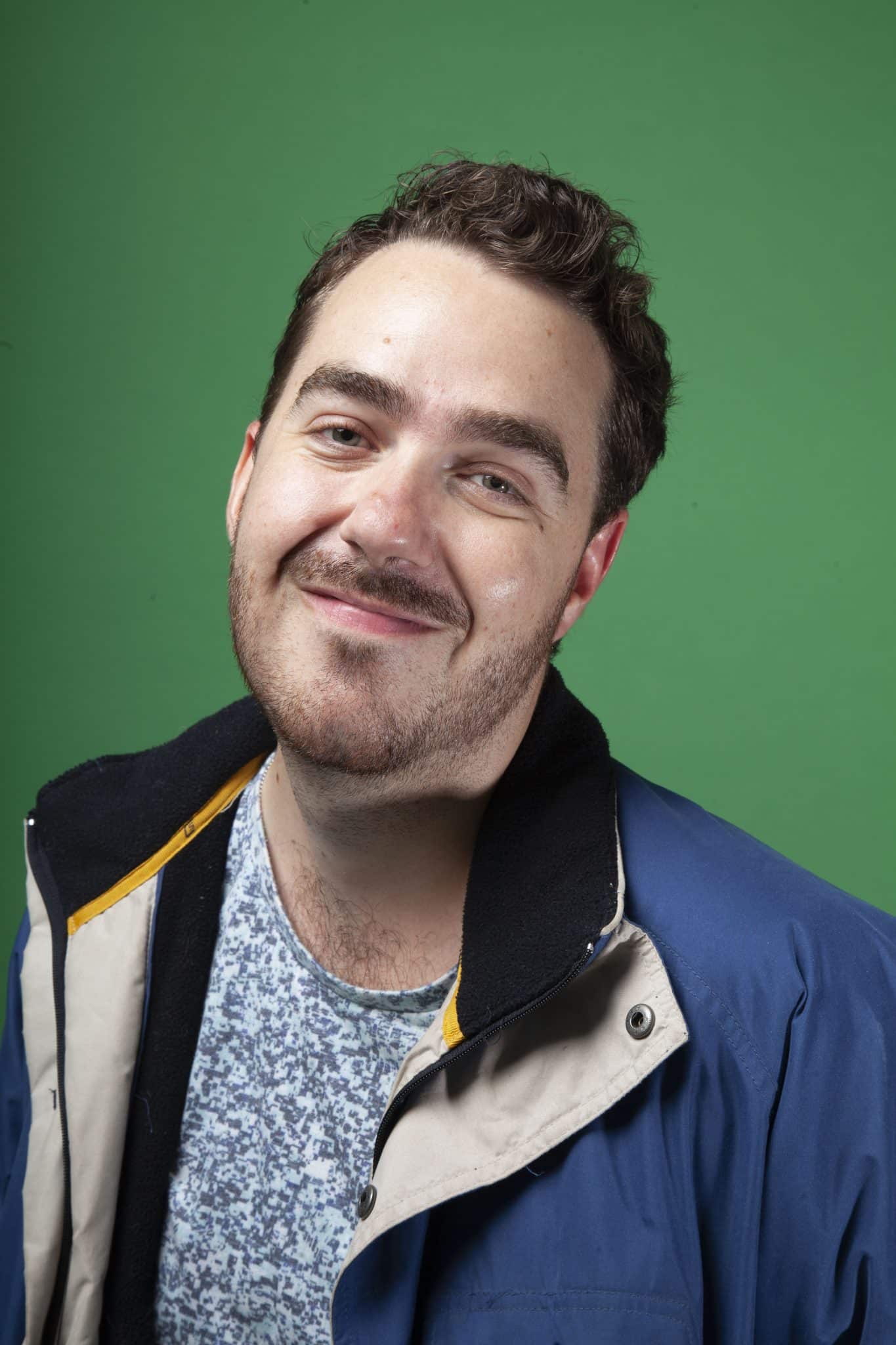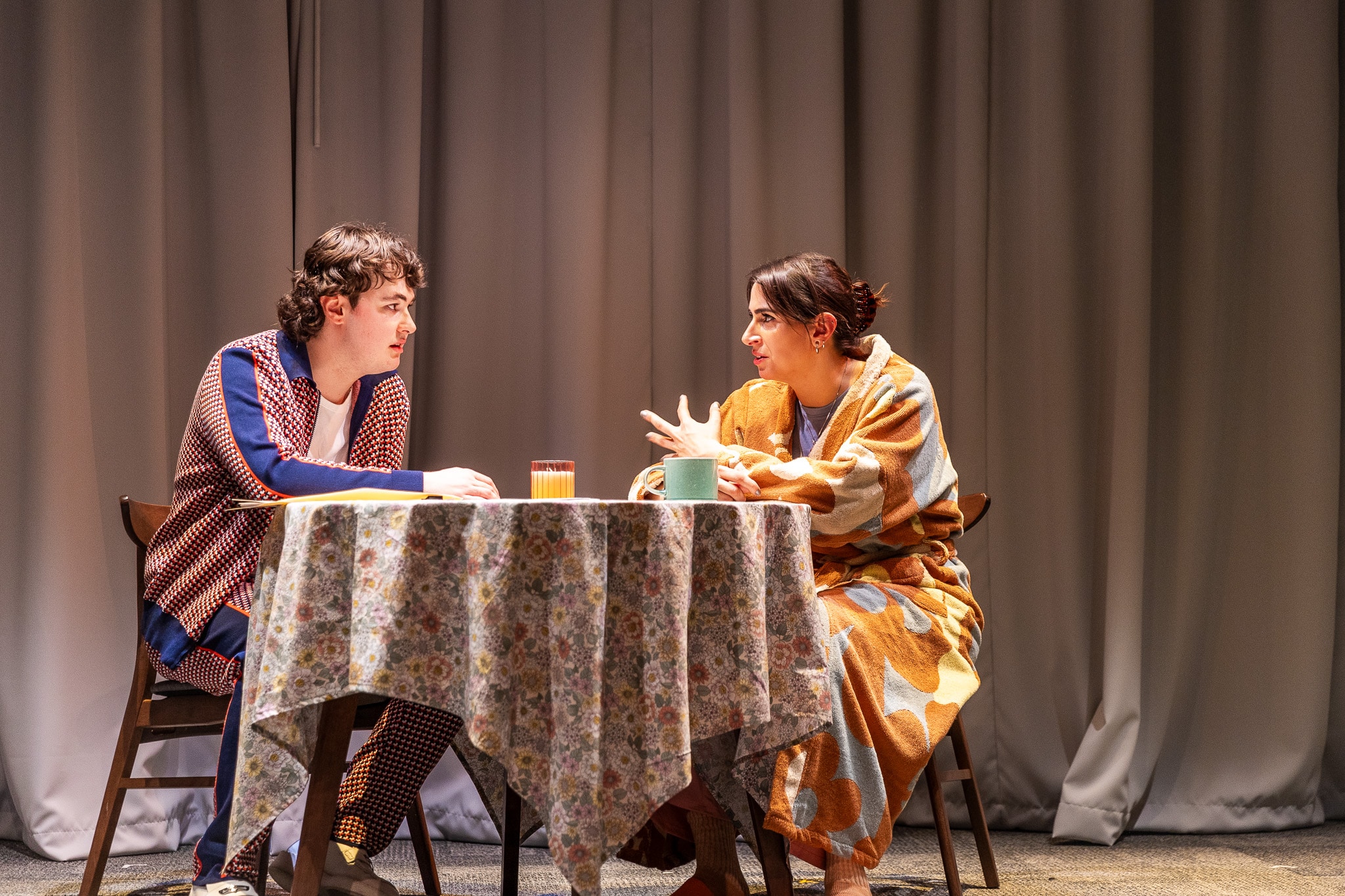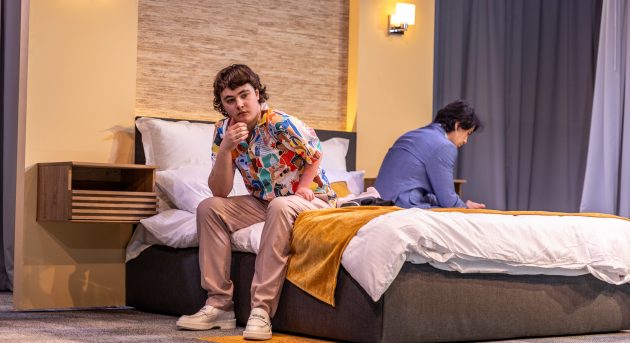Alister Baldwin rings true with TELETHON KID
Sam’s adoring subscribers would describe him as an icon, and Instagram’s honey of disability pride. Sam would describe himself as having one foot in the grave, the other in the bed of his latest hook up—turns out a rare degenerative disease is just what you need to live a little #itsgivingblessed
After rising to fame as the poster child of Perth Children’s Hospital 2007 Telethon, Sam reunites alongside his paediatric doctor-come-lover when they are nominated for a coveted research grant from big pharma. In a sexy ethical nightmare, the influencer’s platform probes the shortcomings of an industry that repeatedly fights those whom it’s meant to help.
Telethon Kid is Alistair Baldwin‘s debut comedy, and is currently playing at the Malthouse Theatre.

Alistair is a writer and comedian based in Naarm/Melbourne. He has written for ABC’s The Weekly, Hard Quiz, Get Krack!n and At Home Alone Together – as well as the Amazon Original series Deadloch. Alistair also wrote and hosted ABC’s ReFrame – a one-hour special for ABC that featured disability-led shorts films, interviews with notable disabled Aussies and a series of comic sketches on disabled history and culture. Alistair was a featured playwright in MTC’s Cybec Electric play readings in 2020, premiering an early excerpt of Telethon Kid (formerly titled Celebrity Skin). Alistair is one half of Nemeses, a toxic comedy collaboration including regular collaborator Vidya Rajan that has produced experimental and digital works for Melbourne Fringe, The Other Film Festival, Running Dog & The Wheeler Centre. In 2022 he premiered his debut stand-up hour Everest at the Melbourne International Comedy Festival.
Can you tell me about your background in theatre?
Alistair: While I’ve done a lot of stuff that I’d say orbits theatre, I’ll confess I have no proper theatre background… Telethon Kid is actually my debut theatre play as a playwright. I’m excited (/shitting myself!). I moved to Melbourne at 18 to study a Bachelor of Screenwriting at the Victorian College of the Arts, and I’ve mostly worked as a TV writer since I graduated. Specifically, I’ve done a lot of satire (writing on shows like The Weekly & Get Krack!n), which has definitely come in handy writing a comedy about the medical-industrial complex. There are definitely distinct differences between screenwriting and playwriting (Telethon Kid’s phenom director Hannah Fallowfield has correctly roasted me for how many short and sharp scene changes/time jumps my screenwriter brain put into the play). But at the end of the day a good character is a good character, a good scene is a good scene, a good joke is a good joke. I mostly avoid mentioning this as it tanks my street cred/sexual viability but… I have also studied and performed a lot of improv comedy. Which is essentially playwriting in real time, and trains your brain to constantly think about what the conflict of a scene is, what the comedy of a scene is, and who all these characters are to each other.
What inspired you to write Telethon Kid?
Alistair: A few years back I was writing for the TV show Hard Quiz, a job which – for better or worse – forces you to deep dive into lots of hyper niche research topics (I know way too much about the card game bridge and the history of McDonalds). One particular ‘special subject’ I got assigned was famed Australian cardiologist Dr Victor Chang. His career included pioneering an artificial heart valve and making headlines after performing a heart transplant on Australia’s youngest ever recipient, 14-yr-old Fiona Coote. Fiona’s career, post-operation, fascinated me. She worked with the Starlight Foundation. She promoted cereal brands. She had a rose hybrid named after her (Fiona’s Wish). She was approached to cameo in Neighbours but ultimately pulled out – citing the pressure to do publicity for the show. She got an Order of Australia. I can’t exactly pin writing Telethon Kid to this one particular moment of inspiration – so much of the play is an amorphous patchwork of ideas and experiences that came from being born a rare disease, growing up in Perth, working in the TV industry, working in marketing before I could get gigs in the TV industry… But something in learning how both Victor and Fiona had these careers and legacies defined by her childhood transplant (and the different ways they experienced ‘fame’) helped unlock a lot of that stuff for me.

How has your personal experience influenced the story?
Alistair: I grew up in Perth, where the annual Channel 7 Telethon to ‘raise money for sick kids’ is a huge deal (per capita, it’s actually the 2nd highest donating telethon in the world). I was never a Telethon Kid personally – but I was a kid with a rare genetic disorder and I know for a fact some of my neurologist’s other patients were chosen to be Telethon Kids! Which I’m totally over, it’s soooo fine, not still jealous about that at all! The kids hospital I’d go to was covered in a million bronze plaques with the Channel 7 logo to signal which particular wing or MRI machine or serenity garden bench was funded by the telethon. So whenever I’d go in to see my neurologist, cardiologist, pulmonologist, etc – this idea that medicine, money and showbiz were inextricably linked kept getting cemented in my brain. Even without being a Telethon Kid, I think anyone born with a rare disease somewhat identifies with this heightened sense of visibility, being a curio or spectacle.
Why is it important to represent disability on stage?
Alistair: So disabled actors get paid. Look, I can wax lyrical about the ‘power of authentic storytelling’, that ‘you can’t be what you can’t see’, uplifting marginalised voices… but the older I get, the more my priority is simply to write stuff that ends up getting a bunch of disabled actors paid. Most casting agents consider abled people as ‘neutral’ – so unless a role is specifically written as disabled they will default to hiring abled actors. Hell, half the time when a role is specifically written as disabled… the casting still defaults to abled actors. In fact, abled actors often get extra kudos for their ‘transformative’ performances as Richard III, Forrest Gump, Dr Scott, Nessarose, Stephen Hawking, Joseph Merrick, Captain Hook, Christy Brown, Fish Lamb, unfortunately I really could go on…
Which kind of people get to make a sustainable living in the arts? What roles can I write that guarantee as few able-bodied-triple-threat-VCA-6-pack-thespians make a living out of the arts as possible. Let’s balance the scales, baby!
I also reckon we’re more interesting (no offense). You always see abled playwrights writing meaty work that finally grapples with their own mortality, agency, legacy… in middle-age? It’s like babe, I was born with congenital myopathy. I did my little existentialist speedrun at age 10. Keep up.
Can you summarise the show in 5 words or less?
Alistair: Big Pharma. Big Drama. Gay?
Telethon Kid is playing now at the Malthouse Theatre.
For tickets and more information, visit the Malthouse website.
Header photo by Tamarah Scott




